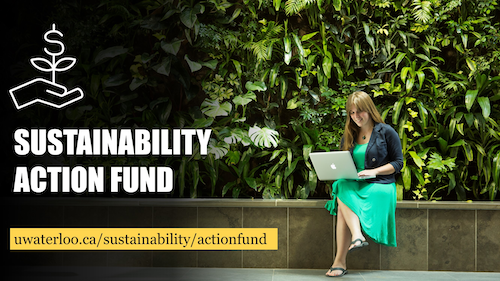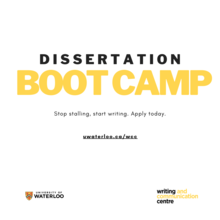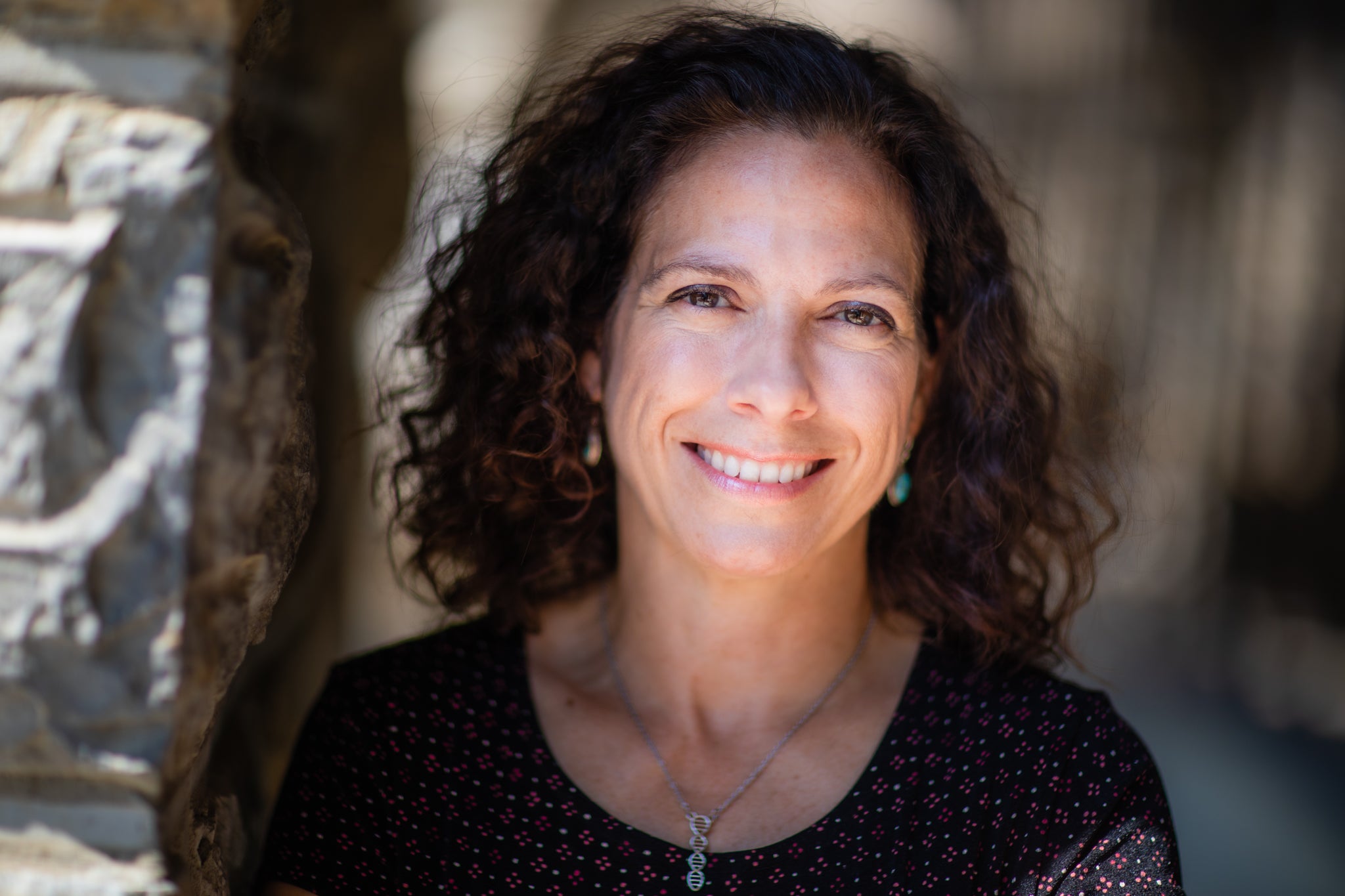The Daily Bulletin is published by Internal and Leadership Communications, part of University Communications
Contact us at bulletin@uwaterloo.ca
Submission guidelines
Editor:
Brandon Sweet
University Communications
bulletin@uwaterloo.ca
A message from the Library and the Office of Research.
Want to help shape the future of data management at the University of Waterloo? What if we told you for just ten minutes, you could make an invaluable contribution to helping us understand our institutional landscape and how we can best meet your diverse needs?
As noted in the 19 October 2021 Daily Bulletin, the University of Waterloo is developing and launching a research data management strategy by March 2023. Right now, we need to understand your experiences, observations, and perspectives on the university’s current support for managing research data, and want to hear your thoughts on future opportunities to meet the evolving data management needs of researchers at the university.
We are interested in the full spectrum of research, scholarly, and creative practices at the University of Waterloo involving the licensing, use, collection, and generation of data in all forms, including digital and analogue, qualitative and quantitative data.
All Waterloo researchers have been invited to share your experiences managing your research data in a 10-minute survey sponsored by the University of Waterloo Office of Research and the Research Data Management Institutional Strategy Working Group. The survey is designed to take about 10 minutes to complete, but may take longer if you wish to provide detailed responses. Your responses to this survey will inform the University’s strategy to make data management easier and more seamless for its researchers and research communities. All responses to the survey will remain confidential.
If you have any questions about this research or the research data management strategy, please contact Nichola Harrilall, or the working group co-chairs Alison Hitchens and Ian Milligan.
A message from the Centre for Extended Learning (CEL).
 The Centre for Extended Learning is proud to announce the first recipient of James D. Leslie Graduate Award, Sarah Chan.
The Centre for Extended Learning is proud to announce the first recipient of James D. Leslie Graduate Award, Sarah Chan.
Sarah began the part-time, online Master of Math for Teachers (MMT) program in Fall of 2016 and completed it in the Spring of 2020 with exceptional grades and a job she loves which involves math and computer science outreach and professional development.
Her journey to complete the MMT took her from grief and depression to a successful career here at Waterloo where she helps instill a love of learning in others.
Read more about Sarah’s journey.
This new award, a graduate student version of the long-running J.D Leslie Prize awarded to undergraduates since 1982, is named for the late James D. Leslie, PhD., who began the University of Waterloo's Correspondence Program in 1968, now known as the Centre for Extended Learning (CEL). The James D. Leslie Graduate Award is awarded annually to a full-time or part-time graduate student who has completed their degree requirements in one of Waterloo’s fully online graduate degree programs, achieving a minimum 80 per cent overall average and demonstrating the benefits of lifelong learning.

A message from the Sustainability Office.
Have an idea to improve campus sustainability? The Sustainability Action Fund (SAF) is now accepting project proposals that advance the University’s Environmental Sustainability Strategy and Shift:Neutral climate action plan.
The SAF has funded 27 projects over the past four years, from student-led events and conferences to awareness campaigns to infrastructure projects such as the new secure bike cage and waste receptacles. These have bridged a wide variety of topic areas, including energy, transportation, waste, and campus engagement. This term’s funding is between $2,000 and $15,000.
Any student, staff, or faculty member can apply, and proposals are due by February 11. For more information and to apply, visit the SAF webpage on the Sustainability site.

The University of Waterloo is launching a student competition that seeks net-zero energy and carbon-neutral performance designs for a sustainable flight school of the future.
Waterloo Institute for Sustainable Aeronautics (WISA) is partnering with the Waterloo Wellington Flight Centre (WWFC), Alsim Flight Training Solutions, and the Region of Waterloo International Airport to host the competition.
The competition kicked off on January 17, 2022, with the winners set to receive $8,500 in total prize money.
“There has been an international shortage of pilots, with Boeing projecting 612,000 new pilots will be needed between 2021 and 2040,” said Suzanne Kearns, director of WISA. “Flight training is an expensive endeavour for students and contributes to carbon and noise emissions.”
“Using innovative technologies such as electric aircraft, flight simulators, and virtual reality, it is feasible to reduce training costs and environmental impacts while simultaneously improving learning effectiveness,” Kearns said.
Student teams will prepare designs for the flight school buildings as well as operational considerations to optimize economic, social, and environmental sustainability, which will be reviewed by a team of judges made up of industry experts.
“The competition promises to spark a holistic rethinking of the aviation training sector as hubs for green innovation,” said Bob Connors, general manager of WWFC. “We are seeking inspirational ideas, exciting designs, and new directions towards a more sustainable future for the air transport training sector.”
There will be opportunities for the student teams to engage with the panel of experts and ask questions about their designs. The judges will choose the top three designs on May 27, 2022, while the final student presentations and winners’ announcements will be at the WISA Annual General Meeting on June 24, 2022.
The student teams are to submit their projects through WISA.

This article originally appeared on Waterloo News.
Climate change will limit where the Winter Olympics can be held as winter changes across the Northern Hemisphere, according to a study by an international team of researchers led by the University of Waterloo.
The study, involving researchers from Canada, Austria and the United States, found that if global emissions of greenhouse gases are not dramatically reduced, only one of the 21 cities that have previously hosted the Winter Olympics would be able to reliably provide fair and safe conditions for the snow sports program of the Games by the end of this century. However, if the Paris Climate Agreement emission targets can be achieved, the number of climate-reliable host cities jumps to eight, with only six considered unreliable.
“The world of winter sport is changing as climate change accelerates, and the international athletes and coaches we surveyed are witnessing the impacts at competition and training locations, including the Olympics,” said Daniel Scott, a professor of Geography and Environmental Management at Waterloo.”
In conducting the study, the researchers reviewed historical climate data from the 1920s to the present day, and future climate change scenarios for the 2050s and 2080s.
They also surveyed international athletes and coaches and found that 89 per cent felt changing weather patterns are affecting competition conditions, and 94 per cent fear climate change will impact the future development of their sport.
“We wanted to understand from the athlete’s perspective what climate and snow conditions made competition fair and safe, and then determine which Olympic hosts could provide those conditions in the future,” added Natalie Knowles, a PhD student and former Canadian elite skier involved in the study.
Weather risk management is more and more important as the average February daytime temperature of host cities has steadily increased – from 0.4°C at the Games held in the 1920s to the 1950s, to 3.1°C at Games during the 1960s to 1990s, and 6.3°C in Games held in the twenty-first century (including the Beijing Games). Additional 21st-century warming of 2°C to 4.4°C is projected depending on our emission pathways.
“We’ve studied the many ways the Winter Olympics has reduced weather risk since the first Games held in Chamonix, France nearly 100 years ago,” said Michelle Rutty of Waterloo’s Faculty of Environment. “But there are limits to what weather risk management strategies can cope with, and we saw those limits exceeded in Sochi and Vancouver.”
“Climate change is altering the geography of the Winter Olympic Games and will, unfortunately, take away some host cities that are famous for winter sport,” said Robert Steiger of the University of Innsbruck in Austria. “Most host locations in Europe are projected to be marginal or not reliable as early as the 2050s, even in a low emission future.”
“The International Olympic Committee will have increasingly difficult decisions about where to award the Games, but the world’s best athletes, who have dedicated their lives to sports, deserve to have the Olympics located in places that can reliably deliver safe and fair competitions,” added Siyao Ma of the University of Arkansas.
The International Olympic Committee has made climate change a priority as it is a founding organization of the United Nations Sports for Climate Action Framework.
“No sport can escape the impacts of a changing climate. Achieving the Paris Agreement targets is critical to save snow sports as we know it and ensure there are places across the world to host the Winter Olympics,” said Scott.
Knowles added: “Sport can be an important agent for change for many people. Athletes want to be a bigger part of the solution.”
The study, Climate change and the future of the Olympic Winter Games: athlete and coach perspectives, was recently published in the journal Current Issues in Tourism.
 "Applications for Dissertation Boot Camp close today," says a note from the Writing and Communication Centre (WCC). "Make writing progress and a plan for moving forward with Dissertation Boot Camp. This four-day program combines virtual workshops with individual writing time and individual consultations to help thesis and dissertation writers set goals and make progress in their work. This online program will take place over Microsoft Teams from Tuesday, February 22 to Friday, February 25, 2022."
"Applications for Dissertation Boot Camp close today," says a note from the Writing and Communication Centre (WCC). "Make writing progress and a plan for moving forward with Dissertation Boot Camp. This four-day program combines virtual workshops with individual writing time and individual consultations to help thesis and dissertation writers set goals and make progress in their work. This online program will take place over Microsoft Teams from Tuesday, February 22 to Friday, February 25, 2022."
As part of the Water Institute's ongoing WaterTalks lecture series, Amy Pruden, W. Thomas Rice Professor, University Distinguished Professor, Via Department of Civil and Environmental Engineering, Virginia Tech, USA will present Harnessing 'Omics to Inform Strategies to Mitigate the Spread of Antimicrobial Resistance as a One Water Challenge on Thursday, January 19.
"There are various One Water dimensions to the antimicrobial resistance (AMR) problem that contribute to its evolution and spread," says the talk's abstract. "Environmental monitoring could provide vital information for mitigating the spread of AMR; this includes assessing antibiotic resistance genes (ARGs) circulating among human populations, identifying key hotspots for evolution and dissemination of resistance, informing epidemiological and human health risk assessment models, and quantifying removal efficiencies by domestic wastewater infrastructure. However, standardized methods for monitoring AMR in the water environment will be vital to produce the comparable datasets needed to address such questions. This seminar will explore a framework for standardizing methods for monitoring AMR in wastewater, recycled water, and surface water in order to achieve this purpose."

Amy Pruden is a University Distinguished Professor in the Department of Civil & Environmental Engineering at Virginia Tech, USA. Her research focuses on converging microbial ecology and environmental engineering in identifying strategies to mitigate the spread of pathogens and antibiotic resistance in the environment.

Are you interested in transforming the local transportation system to achieve climate action? You can explore solutions in sustainable transportation at the upcoming Transportation Hack for Health.
On January 21 and 22, you're invited to participate in a discovery lab hosted by GreenHouse, the Geographies of Health in Place lab, and the Faculty of Environment. At the Transportation Hack for Health, you will learn about sustainable transportation, identify opportunities for local innovation, and pitch your ideas for funding.
There are prizes available:
The registration deadline is today.
Employers hosting Virtual Employer Information Session (VEIS) next week include: BDO Canada LLP, Rogers, Federal Government of Canada, Deloitte, Isaac Operations, Capula Investment Management, Canvass AI, OMERS, AMD, Fairfax Financial Holdings, Snapcommerce Technologies Inc., Properly Inc., Open Text, and Hatch Ltd.
Make sure to register through WaterlooWorks and check the calendar for any updates.
Campus Wellness locations will be closed on Thursday January 20 from 8:30 a.m. to 11:30 a.m. due to an all-staff meeting.
Press X to continue: Microsoft to buy Activision for $69B
Students can visit the Student Success Office online for supports including academic development, international student resources, immigration consulting, leadership development, exchange and study abroad, and opportunities to get involved.
Finance and Student Financial Services will be closed to in-person service in EC5 until further notice. Students, please visit the Centre in Needles Hall or contact Student Financial Services at the helpdesk.
Instructors looking for targeted support for developing online components for blended learning courses, transitioning remote to fully online courses, revising current online courses, and more please visit Agile Development | Centre for Extended Learning | University of Waterloo (uwaterloo.ca).
Instructors can visit the Keep Learning website to get support on adapting their teaching and learning plans for an online environment.
Course templates are available within your course in LEARN to help you build and edit your content and assignment pages quickly.
The following workshops, webinars, and events are offered by the KL team (CTE, CEL, ITMS, LIB):
Employees can access resources to help them work remotely, including managing University records and privacy of personal information. Here are some tips for staying healthy while working from home.
Stay informed about COVID cases on campus by consulting the COVID case tracker.
The Writing and Communication Centre has virtual services and programs to help undergrads, grad students, postdocs and faculty members with academic writing.
Co-op students can get help finding a job and find supports to successfully work remotely, develop new skills, access wellness and career information, and contact a co-op or career advisor.
The Centre for Career Action (CCA) is currently offering virtual services only. Questions about CCA's services? Live chat or call 519-888-4047 between 8:30 a.m. and 4:30 p.m. EST, Monday to Friday.
Drop-in to Warrior Virtual Study Halls on Wednesdays from 5:30 p.m. to 7:00 p.m. Come together in this virtual space to set goals and work independently or in groups each week.
Renison's English Language Institute continues to offer virtual events and workshops to help students practice their English language skills.
If you feel overwhelmed or anxious and need to talk to somebody, please contact the University’s Campus Wellness services, either Health Services or Counselling Services. You can also contact the University's Centre for Mental Health Research and Treatment. Good2Talk is a post-secondary student helpline available to all students.
The Library will continue to focus on digital resources and consultations as we start winter term with classes primarily online, though spaces will be open for drop-in individual study space, bookable individual study rooms, drop-in access to computers and printers, book pick-up services and IST Help Desk support. Special Collections & Archives and the Geospatial Centre will be accessible by appointment. Full details on current services and hours are available on the Library’s COVID-19 Update webpage.
The Faculty Association of the University of Waterloo (FAUW) continues to advocate for its members. Check out the FAUW blog for more information.
The University of Waterloo Staff Association (UWSA) continues to advocate for its members. Check out the UWSA blog for more information.
The Sexual Violence Prevention and Response Office (SVPRO) supports all members of the University of Waterloo campus community who have experienced, or been impacted, by sexual violence. This includes all students, staff, faculty and visitors on the main campus, the satellite campuses, and at the affiliated and federated Waterloo Institutes and Colleges. For support, email: svpro@uwaterloo.ca or visit the SVPRO website.
The Office of Indigenous Relations is a central hub that provides guidance, support, and resources to all Indigenous and non-Indigenous campus community members and oversees the University's Indigenization strategy.
The Waterloo Indigenous Student Centre, based at St. Paul’s University College, provides support and resources for Indigenous students, and educational outreach programs for the broader community, including lectures, and events.
WUSA supports for students:
Peer support - MATES, Glow Centre, RAISE, Women’s Centre - Visit https://wusa.ca/peersupport to book an appointment either in person or online for the Fall term.
Food Support Service food hampers are currently available from the Turnkey Desk 24/7 in the Student Life Centre. Drop off locations are also open again in SLC, DC, DP, SCH and all residences.
Co-op Connection all available online. Check https://wusa.ca for more details.
Centre for Academic Policy Support - CAPS is here to assist Waterloo undergraduates throughout their experience in navigating academic policy in the instances of filing petitions, grievances and appeals. Please contact them at caps@wusa.ca. More information is available.
WUSA Student Legal Protection Program - Seeking legal counsel can be intimidating, especially if it’s your first time facing a legal issue. The legal assistance helpline provides quick access to legal advice in any area of law, including criminal. Just call 1-833-202-4571.
Empower Me is a confidential mental health and wellness service that connects students with qualified counsellors 24/7. They can be reached at 1-833-628-5589.
GSA-UW supports for graduate students:
The Graduate Student Association (GSA-UW) supports students’ academic and social experience and promotes their well-being.
Advising and Support - The GSA advises graduate students experiencing challenges and can help with navigating university policies & filing a grievance, appeal, or petition.
Mental Health covered by the Health Plan - The GSA Health Plan now has an 80 per cent coverage rate (up to $800/year) for Mental Health Practitioners. Your plan includes coverage for psychologists, registered social workers, psychotherapists, and clinical counsellors.
Dental Care - The GSA Dental Plan covers 60 per cent to 70 per cent of your dental costs and by visiting dental professionals who are members of the Studentcare Networks, you can receive an additional 20 per cent to 30 per cent coverage.
Student Legal Protection Program - Your GSA fees give you access to unlimited legal advice, accessible via a toll-free helpline: +1-833-202-4571. This advice covers topics including housing disputes, employment disputes, and disputes with an academic institution.
The Graduate House: Open Monday to Friday 11:30 a.m. - 6:00 p.m. The Graduate House is an essential component of graduate student life, and we're working hard to make it available to students. The quality food with local ingredients you love is available for takeaway. And graduate students who paid their fees can still get discounts and free coffee.
BIPOC Student Collective - The Collective is a safe space for BIPOC LGBTQ2+ students and aims to foster intergenerational and peer-to-peer support and mentorship. Join the online Discord channel for solidary chats and drop-in sessions.
Warriors vs. Laurier Blood Donation Battle. Join our “Waterloo Warriors” team on the Blood.ca website or app. #ItsInYouToGive
Healthy Warriors at Home, free online programs including Nutrition Guides, Personal Training Consults, Health Webinars, Mindfulness Courses and On-demand Fitness. Sign up now.
Warrior Rec Live Fitness Classes, free classes Monday to Thursday with a valid Warrior Rec membership. Barre, Yoga, Zumba, Warrior Workout, Boxing and more. Register now.
Quantum Nano Collision Seminar Series: Professor Kevin Musselman, Wednesday, January 19, 4:00 p.m. to 5:00 p.m.
CrySP Speaker Series on Privacy featuring Sarah Lamdan, CUNY School of Law, “Data Analytics Companies in Academia,” Wednesday, January 19, 1:30 p.m., on Zoom.
WaterTalk: Harnessing 'Omics to Inform Strategies to Mitigate the Spread of Antimicrobial Resistance as a One Water Challenge, presented by Amy Pruden, Thursday, January 20, 10:30 a.m.
GreenHouse Transportation Hack for Health, Friday, January 21 to Saturday, January 22, Virtual Event and Pitch Competition, details and registration information can be found on the event page.
SWORDC seminar, "Child & youth mental health need, service use & resource allocation: Analyses using 2014 Ontario Child Health Study data linkages" by Dr. Laura Duncan, Professor of Psychiatry and Behavioural Neurosciences, McMaster University," Friday, January 21, 1:00 p.m.
WaterLeadership: Media 101 - Tips for Engaging with the Media, presented by Pamela Smyth. Tuesday, January 25, 1:00 p.m.
NEW - GEDI Exchange Webinar - A 30 Minute Exchange with GeoMate and Lim Geomatics: Tuesday, January 25, 1:00 p.m. Join this discussion with GeoMate and Lim Geomatics as they look “Beyond GPS: Leveraging geospatial data to transform how we live and work”. More info and registration here: https://uwaterloo.ca/gedi-exchange/30-minute-exchange
On this week's list from the human resources department, viewable on the UWaterloo Talent Acquisition System (iCIMS):
Secondments/Internal temporary opportunities
Affiliated and Federated Institutions of Waterloo opportunities
https://uwaterloo.ca/careers/other-opportunities
The Daily Bulletin is published by Internal and Leadership Communications, part of University Communications
Contact us at bulletin@uwaterloo.ca
Submission guidelines
The University of Waterloo acknowledges that much of our work takes place on the traditional territory of the Neutral, Anishinaabeg, and Haudenosaunee peoples. Our main campus is situated on the Haldimand Tract, the land granted to the Six Nations that includes six miles on each side of the Grand River. Our active work toward reconciliation takes place across our campuses through research, learning, teaching, and community building, and is co-ordinated within the Office of Indigenous Relations.